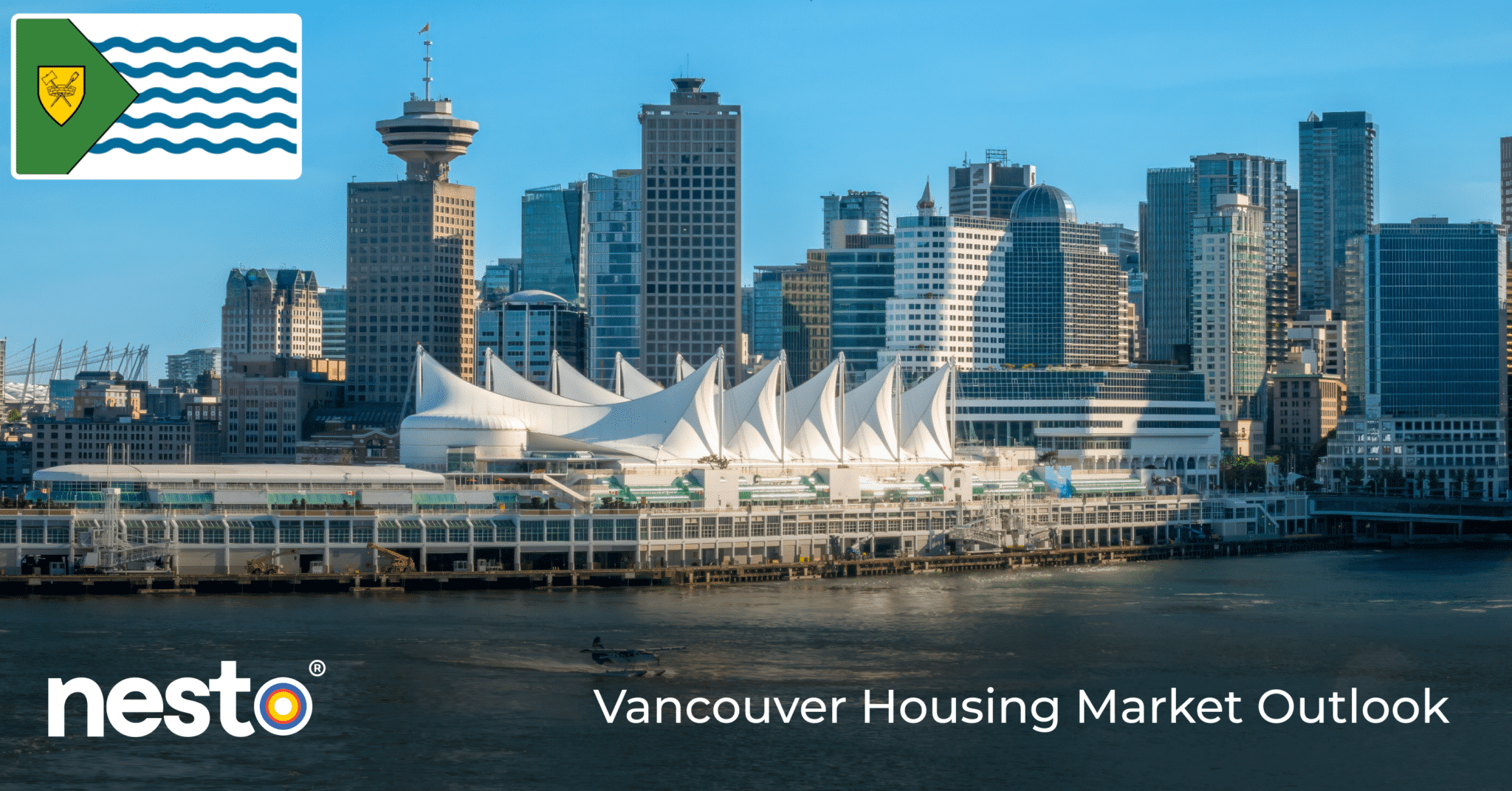Vancouver Housing Market Outlook 2025

Table of contents
Vancouver Market Report Summary
- The average selling price of a home in Vancouver decreased by 2.9% year-over-year to $1,177,100 in May 2025.
- The average selling price of a single-family home in Vancouver decreased by 3% year-over-year to $1,996,700 in May 2025.
- The average selling price of a townhouse/multiplex in Vancouver decreased by 3.4% year-over-year to $1,106,800 in May 2025.
- The average selling price of a condo in Vancouver decreased by 2.4% year-over-year to $757,300 in May 2025.
- The average rent in Vancouver decreased by 6% year-over-year to $2,839 for May 2025.
- July 15, 2025: Today’s lowest mortgage rate in Vancouver is
for a 5-year fixed.
Composite Home Prices
![]()
The average selling price of a home in Vancouver was $1,177,100 for the month of May 2025, that’s decreased by 0.6% compared to the previous month. On a year-over-year basis, Vancouver home prices have decreased 2.9% over the last 12 months.
Single-family Home Prices
![]()
The average selling price of a single-family home in Vancouver was $1,996,700 for the month of May 2025, that’s decreased by 1.1% compared to the previous month. On a year-over-year basis, single-family home prices in Vancouver have decreased by 3% over the last 12 months.
Townhouse and Multiplex Prices
![]()
The average selling price of a townhouse in Vancouver was $1,106,800 for the month of May 2025, that’s increased by 0.4% compared to the previous month. On a year-over-year basis, the price of a townhouse in Vancouver has decreased by 3.4% over the last 12 months.
Condo Prices
![]()
The average selling price of a condo in Vancouver was $757,300 for the month of May 2025, that’s decreased by 0.7% compared to the previous month. On a year-over-year basis, the price of a condo in Vancouver has decreased 2.4% over the last 12 months.
We’re curious…
Vancouver Housing Market Summary
Data from the Greater Vancouver Realtors (GVR) indicates that the average price of resale residential homes sold across Vancouver in May 2025 was $1,177,100, and it decreased of 2.9% compared to a year ago.
GVR also reported a sales-to-new-listings ratio (SNLR) of 34%, indicating a Buyers in Vancouver for May 2025.
Vancouver Home Buyers Regain Control as Listings Hit 12-Year High
According to the Greater Vancouver Realtors (GVR), buyers in Metro Vancouver are gaining the upper hand as sales decline, inventory builds, and home prices continue to edge lower. Residential sales in May 2025 decreased 18.5% year-over-year to 2,228 units, falling below the 10-year seasonal average of 3,206 and marking the sixth consecutive month of declining resale activity. The home sales slowdown, combined with a surge in listings, pushed the total number of active properties on the MLS to 17,094, up nearly 26% from last year and the highest level in over a decade.
● Benchmark price (all homes): $1,177,100 (down 2.9% year-over-year)
● Detached home benchmark: $1,997,400 (down 3.2%)
● Townhome benchmark: $1,106,800 (down 3.4%)
● Apartment benchmark: $757,300 (down 2.4%)
● Sales-to-active listings ratio: 13.4% (buyers’ market territory)
Detached Home Sales Decrease as Sellers Adjust Expectations
Detached home sales decreased by 22.7% in May 2024, while apartment sales dropped 18.8%, and attached sales fell 10.3%. Prices for all property types continued to soften, with detached prices down 1.2% month-over-month. Townhomes were the only segment to see a slight gain of 0.4% in May. Time on market also ticked up slightly, reinforcing the shift in momentum.
Sellers are increasingly adjusting their expectations as competition grows, particularly with the influx of completed yet unsold condos contributing additional supply pressure. With numerous listings now available, prospective buyers have more time and leverage to negotiate deals, especially in the detached segment, where the sales-to-active listings ratio is just 10.2%, significantly below the threshold typically associated with price stability.
Impact on Mortgages and Monetary Policy
For homebuyers, Vancouver’s rising supply and falling prices offer a rare opportunity for breathing room. If the Bank of Canada cuts interest rates later this year, the combination of improved affordability and increased negotiating power could encourage more home buyers in Vancouver to come off the sidelines. Renewers are unlikely to benefit from slightly lower valuations if prices continue to trend down, especially in the detached segment. Lower valuations can affect the loan-to-value (LTV) ratio, effectively limiting mortgage rate discounts for insurable renewals. At the same time, refinance options could become tighter if appraisals come in lower than expected. As Vancouver shifts deeper into a buyer’s market, softening prices may do more to boost affordability than rate cuts alone, reinforcing the BoC’s need to balance rate decisions with real estate dynamics across Canada.
Month-over-Month Market Expectations for Vancouver
Transactions – Number of Sales
![]()
The number of sales in Vancouver was 2,228 during May 2025, that’s increased by 3% compared to the previous month. On a year-over-year basis, sales in Vancouver have decreased by 18.5% over the last 12 months.
New Listings
![]()
The number of new listings in Vancouver was 6,620 during May 2025, that’s decreased by 3.4% compared to the previous month. On a year-over-year basis, new listings in Vancouver have increased by 3.9% over the last 12 months.
Real Estate Market
![]()
The sales-to-new-listings ratio (SNLR) in Vancouver was 34% during May 2025, indicating a Buyers. On a monthly basis, that’s increased by 6.6% compared to the previous month. Vancouver’s yearly sales-to-new-listings ratio has decreased by 21.5% over the last 12 months.
The sales-to-new-listings ratio (SNLR) measures the number of home sales compared to new listings. An SNLR under 40% suggests a buyer’s market in which buyers have the upper hand and more negotiating power. An SNLR between 40% and 60% is a balanced market, while an SNLR of over 60% is considered a seller’s market.
Annual Changes to Composite Home Prices in Vancouver
We’re curious…
Vancouver Market Rents Summary
The average rent in Vancouver was $2,839 for the month of May 2025, which decreased by 6% on a year-over-year basis.
The average rent for a bachelor apartment in Vancouver was $0 for the month of May 2025, which 0 by 0% on a year-over-year basis.
The average rent for a 1-bedroom apartment in Vancouver was $2,544 for the month of May 2025, which decreased by 5% on a year-over-year basis.
The average rent for a 2-bedroom apartment in Vancouver was $3,358 for the month of May 2025, which decreased by 7% on a year-over-year basis.
The average rent for a 3-bedroom apartment in Vancouver was $2,544 for the month of May 2025, which decreased by 7% on a year-over-year basis.
How Does Renting Compare with Homeownership in Vancouver?
Each $100,000 in mortgage balance costs an average of $521.15 per month on nesto’s lowest fixed 5-year rate at
Rates used for calculation are those offered on insured purchases with less than a 20% downpayment on a 25-year amortization. Canada’s policy rate is 2.75%, and nesto’s prime rate is set to 4.95%.
Rental Price Changes by City
Rental Price Changes by Province
Rental Price Growth by Housing Type
We’re curious…
Frequently Asked Questions on Vancouver Housing Market Outlook for 2025
Will Vancouver’s housing prices increase in 2025?
Vancouver’s home prices are expected to rise slightly in 2025 as demand remains strong and housing supply struggles to keep pace.
Is Vancouver’s housing market going to crash?
A crash is unlikely in Vancouver. Despite affordability concerns, low inventory and high demand will sustain home prices.
How affordable will Vancouver homes be in 2025?
Vancouver remains Canada’s most expensive housing market. Buyers may consider condos or suburban areas in the GVA for better affordability.
What trends will drive Vancouver’s market in 2025?
Factors include low housing supply, increasing demand, and declining mortgage rates.
Should I buy a home in Vancouver in 2025?
If you’re financially prepared to become a homeowner, buying during periods of price stabilization in 2025 could offer long-term benefits.
Why Choose nesto
At nesto, our commission-free mortgage experts, certified in multiple provinces, provide exceptional advice and service that exceeds industry standards. Our mortgage experts are non-commissioned, salaried employees who provide impartial guidance on mortgage options tailored to your needs and are evaluated based on client satisfaction and advice quality. nesto aims to transform the mortgage industry by providing honest advice and competitive rates using a 100% fully digital, transparent, seamless process.
nesto is on a mission to offer a positive, empowering and transparent property financing experience – simplified from start to finish.
Contact our licensed and knowledgeable mortgage experts to find your best mortgage rate in Canada.
Ready to get started?
In just a few clicks, you can see our current rates. Then apply for your mortgage online in minutes!















